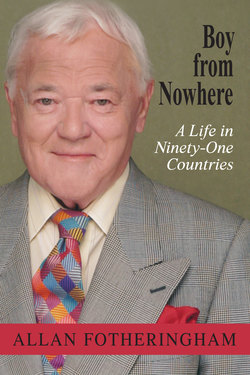Читать книгу Boy from Nowhere - Allan Fotheringham - Страница 12
На сайте Литреса книга снята с продажи.
6
ОглавлениеNewspaper Madness
A dignified and shy girl arrives from England to be Erwin Swangard’s new secretary. On her first day veteran reporter Barry Broadfoot walks by her desk, puts down a dime, and walks on. He does the same thing every day until two weeks later the bewildered Ann Barling summons up the courage to ask him what he’s doing.
“When it gets to forty bucks,” explains Broadfoot, “I want a piece of tail.”
This was the Vancouver Sun of the 1950s.
At the office Christmas party Nelles Hamilton and Don Stainsby get into a fistfight. Somebody always got into a fight at the office Christmas party. No one paid any attention to them until we heard a blood-curdling scream. Nelles had Stainsby pinioned across an office desk, which as usual was two feet deep in stale newspapers, yellowing copy paper, and dead cheese sandwiches — all disguising that Stainsby was impaled through his back by a buried copy spike.
This was the Vancouver Sun of the 1950s.
When Sputnik went up, publisher Don Cromie ordered Sun photogs to the top of Cromie-owned Grouse Mountain across the harbour on the theory that the Sun, being five thousand feet closer to a world scoop, would catch the satellite as it flew past. Deni Eagland — or was it Brian Kent? — drew a sharp fingernail across a negative and (presto!) we had another international first.
At the famous Cromie annual blowout at the Commodore Ballroom, after Don unveiled a huge red neon sign signifying a record two hundred thousand circulation and rolled out onstage a white Cadillac convertible for the circulation manager, Bobby Ackles — originally, the water boy of the B.C. Lions, later general manager, and still later a high poobah with the Dallas Cowboys — punched out assistant sports editor Merv Peters all the way down the Commodore’s celebrated long staircases.
We separated them, made them shake hands, and went off to fetch the car. By the time we got back, Ackles had knocked out Merv’s lights and kicked him in a knee, which required serious hospital time. Ah, fun times.
Tom Thumb Butler was quietly typing in the sports room when the cops walked in. They wanted him in the slammer immediately for forty-three unpaid parking tickets. We had to do a whip-around to save him from a criminal record.
Stu McNeill, who was the Canadian Army hundred-yard sprint champion in Europe during the war, was the natural expert to cover the 1954 four-minute mile showdown between Roger Bannister and John Landy at Vancouver’s British Empire Games.
A week before the event, emboldened by the grape, Stu was detected outside the Kerrisdale Arena after covering a lacrosse game, waving in taxis and offering $20 bills to anyone who would accept his largesse. Erwin busted him to covering archery and badminton for the Games, giving the priceless track assignment to me, a kid who had just graduated months earlier from UBC.
The next night Stu warmed up — awaiting Erwin’s arrival — by hurling typewriters against the columns that held up the Sun Tower. By the time Erwin appeared, dodging like O.J. Simpson at the airport, Stu had destroyed twenty-five typewriters. Erwin survived. Stu didn’t.
One night, after a fight in the darkroom, John Kirkwood put his fist through a window, occasioning a major flow of claret. Tom Ardies and Nelles Hamilton attempted to drive him the several blocks to the emergency ward of St. Paul’s Hospital. Only one problem. They were so blasted, the two best reporters in town, they couldn’t remember where it was.
Assistant publisher Himie Koshevoy walked through the women’s department, asking how things were “in the Ovary Tower.”
Simma Holt, enraged, charged up to Jack Scott at the city desk because of changes in her copy. “What’s wrong?” he protested. “I changed only three words.” The words were: “By Simma Holt.” He fled in panic to the men’s loo and locked himself in a cubicle. Simma followed, stood on the throne in the adjoining booth, and beat him over the head.
Tom Ardies, the best reporter on the paper, walked into Erwin’s office one day and demanded “a raise or else.”
Erwin said, “I think I’ll take the or else.”
Ardies went back to his desk and started typing.
Fashion editor Marie Moreau was sent to Cuba to interview new dictator Fidel Castro. She got the interview, beating out the astounded world press. On return, a girlfriend asked her if she had slept with Castro. She replied, “How did you think I got the interview?”
Football writer Annis Stukus was sent to Quemoy and Matsu off Formosa (Taiwan), as a third world war was threatening, stopping off first to pose in a tin helmet in a foxhole dug in the English Bay sand by Sun photogs.
After the season-end B.C. Lions drunk, Stuke staggered into the sports office with the hot news that the very popular line coach from Texas had been told he was sacked but should go home quietly to Abilene and his retirement would be announced down the track.
When we reported this big-time hypocrisy in our first edition, denials from the Lions filled every radio and TV newscast in town. A hungover Stuke began to question his memory. I, being the nervous kid on the sports desk, had to make a quick decision whether to kill the scoop before the second edition.
Managing editor Hal Straight, all of two hundred and sixty pounds in his $3,000 camel hair topcoat, eventually arrived in the office with casual advice as I babbled the crisis to him: “Kid, don’t worry. If you’re right, you’re right. If you’re wrong, you’re fired.”
It was a dull time.
This is what I came back to.
